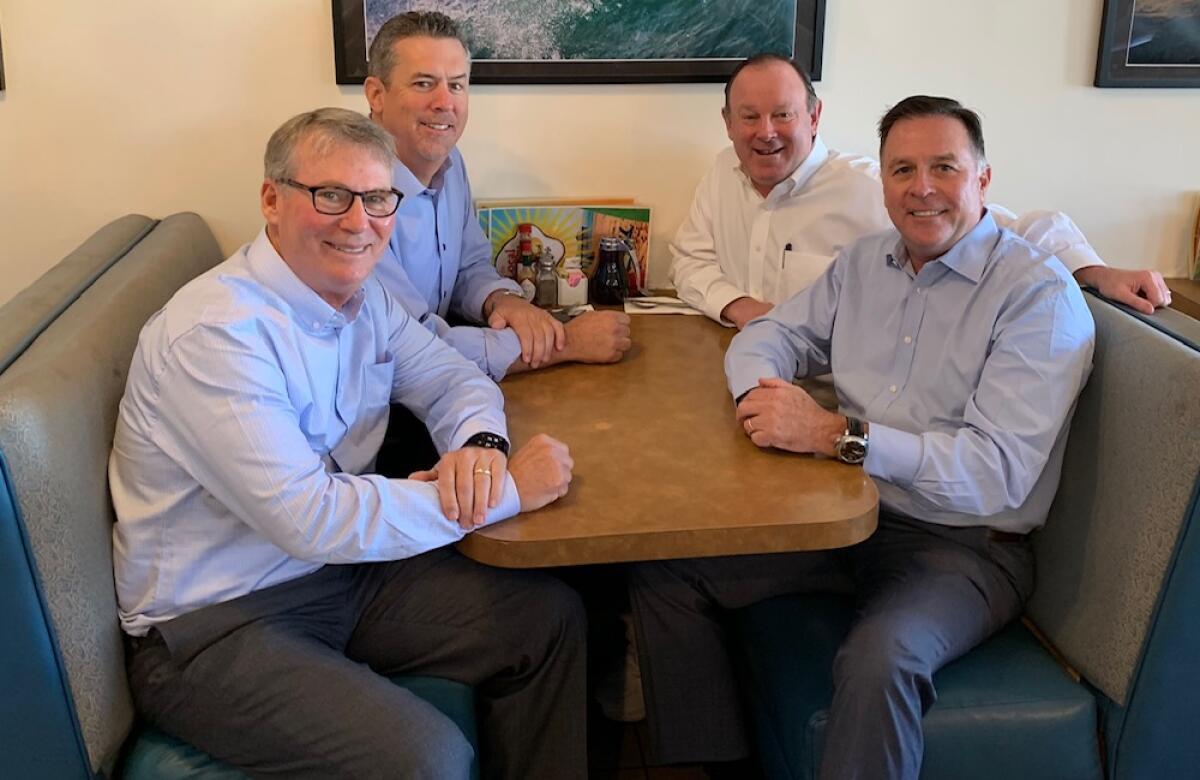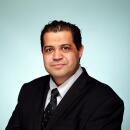Column: How four friends from college hatched a plan over breakfast to help L.A. youth

- Share via
You’re not supposed to remember a breakfast with college friends that took place 25 years ago, but as Michael Gottlieb, Mike Rosenberg, Allen Lynch and W. Chip Eggers walk into the Local Yolk in Manhattan Beach, they immediately gravitate toward the same booth where they sat in 1994.
The old friends joke they have a hard time remembering what they had for breakfast yesterday, but remember every detail of the meals they ate when the idea for what would become Westcoast Sports Associates (WSA) was hatched over coffee, bacon and eggs.
“We recognized there was a big void for youth sports in L.A. and we thought maybe we could help out and do our part,” Rosenberg said. “We had all been dealt a lucky hand in life and the commonality between us was the life lessons we learned from sports. We felt we had an obligation to give back.”
Gottlieb, Rosenberg and Lynch graduated from UCLA while Eggers graduated from USC in the early 1980s. They’re 57 years old now and have become successful businessmen outside of sports. None of them were accomplished athletes, but all believe the foundation for their success began in youth sports.
One of Lynch’s business mentors was Steve Soboroff, who is currently the commissioner of the Los Angeles Police Commission but was then president of the Los Angeles Recreation and Parks Commission. Soboroff told him what they lacked was sports programs.
“People talk about under-served kids, but these kids aren’t served at all,” Lynch said Soboroff told him. “They have no chance to participate in sports and get positive reinforcement and positive direction in their life. Many are on the freeway to jail, and sports programs funded by WSA can serve as an offramp.”
Lynch toured several parks and quickly centered his focus on Jim Gilliam Recreational Center in South Los Angeles.
“It had become an unsafe place to be,” Lynch said. “They were trying to get sports programs to drive kids back into the park and keep them away from bad influences.”
WSA was founded as a nonprofit organization in 1995 with the goal to give economically disadvantaged children in Southern California the opportunity to play sports. The organization has awarded nearly $4 million since its inception and allocates more than $250,000 each year in grant funding to community-based partners. The funds help more than 10,000 kids each year play sports ranging from basketball and baseball to soccer and softball.
The biggest fundraising event for the foundation is an annual gala, which takes place Sunday at the Beverly Hilton and will honor Angels great and Hall of Famer Rod Carew. The inaugural event took place in 1995 and honored broadcaster Roy Firestone, who was contacted by Eggers’ friend and former USC quarterback Paul McDonald. When the event was over, McDonald suggested creating the Roy Firestone Award and making him a permanent part of the organization.
“Roy was so great, and WSA needed someone like that in order for it to succeed,” McDonald said. “We couldn’t cold call Kareem Abdul-Jabbar, who became an honoree. We didn’t have a chance. This organization doesn’t exist or certainly wouldn’t be as successful without Roy.”
Firestone has booked award recipients such as John Wooden, Vin Scully, Wayne Gretzky, Arnold Palmer and Jack Nicklaus. Instead of having them accept the award and make a short speech, Firestone sits down with them and stages a long-form interview similar to his “Up Close” show on ESPN.
“I’m so proud of what we do,” Firestone said. “It’s under the radar. I personally contact the honorees and acquire the sports memorabilia we auction off. I’m hands on. I literally go to framers to get things framed. I don’t know what my legacy is in broadcasting, but I hope this will be my legacy.”
The four friends who wanted to raise money for youth sports when they sat down for breakfast 25 years ago now laugh when they look at the list of honorees going into Sunday’s event.
“It still doesn’t seem real,” Eggers said. “But you know it’s real when you talk to the kids involved with the programs. That’s the best part.”
::
Whenever the Chargers have a home game in which the opposing fans take over, there’s talk of moving the team back to San Diego, their home of 56 years. It makes sense, but there’s simply no putting the toothpaste back in that tube. It’s off the brush, spit out and already down the drain with the mouthwash.
The Chargers didn’t move to L.A. because of the fans, they’re here to move into a new $5-billion stadium with lease terms as favorable as those they enjoyed at Qualcomm Stadium, where they also were tenants along with another team.
Look at Los Angeles’ 21 years without the NFL. The city lost two teams controlled by frugal owners who failed to get the public to pay for their new stadiums. The NFL returned when a billionaire, Stan Kroenke, gained control of the Ramsand then privately financed a new stadium. Maybe someone will come along and convince the Spanos family to sell the Chargers for at least $3 billion and move them from the second-biggest media market in the country to the 29th and privately finance a stadium.
That scenario doesn’t seem possible for at least two decades. The Chargers have a 20-year lease to play at SoFi Stadium, which is opening next year, with options to extend it for another 20 years. Beyond the lease, the Chargers are tied to the new stadium through naming rights, advertisements, personal seat licenses and jointly sold suites.
For example, when SoFi became the naming-rights partner of the new stadium for 20 years, it also became an official partner of the Rams and Chargers. Similarly, when American Airlines became the naming-rights partner of the stadium’s plaza, it also became the teams’ official airline. When Pepsi was recently named the official soft drink for the stadium, it also became the teams’ official soft drink.
This doesn’t even take into account the fact that the Chargers are obligated to pay NFL owners a $650-million relocation fee over the next 10 years for the right to play in Los Angeles. It would be hard to imagine them doing that only to relocate to San Diego.
San Diego deserves an NFL team, but the chances of it being the Chargers are remote at best.
::
It’s no surprise the Lakers with LeBron James and Anthony Davis enter this season with the most expensive ticket in the NBA at an average price of $286.97, according to TickPick, a secondary ticket marketplace. The Clippers made the biggest jump from last season to this season, with the average price of a home game jumping 209% after adding Kawhi Leonard and Paul George. They’re currently fifth in average price at $173.97.
The Lakers are the most popular ticket on the road with an average price of $290.18, followed by the Clippers at $202.93. The cheapest ticket for Tuesday’s season opener between the Clippers and Lakers is $150 with the “get-in” price for their Christmas Day rematch starting at $250.
More to Read
Go beyond the scoreboard
Get the latest on L.A.'s teams in the daily Sports Report newsletter.
You may occasionally receive promotional content from the Los Angeles Times.











